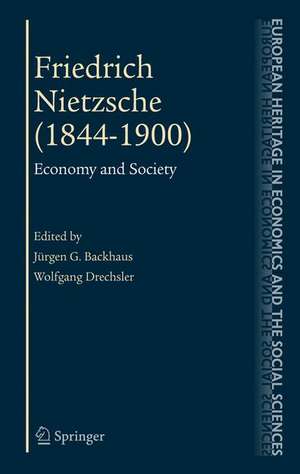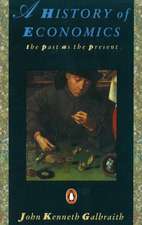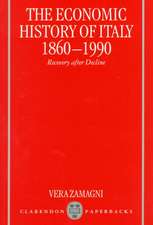Friedrich Nietzsche (1844-1900): Economy and Society: The European Heritage in Economics and the Social Sciences, cartea 3
Editat de Jürgen Backhaus, Wolfgang Drechsleren Limba Engleză Hardback – 17 aug 2006
| Toate formatele și edițiile | Preț | Express |
|---|---|---|
| Paperback (1) | 639.08 lei 6-8 săpt. | |
| Springer Us – 8 dec 2010 | 639.08 lei 6-8 săpt. | |
| Hardback (1) | 645.47 lei 6-8 săpt. | |
| Springer Us – 17 aug 2006 | 645.47 lei 6-8 săpt. |
Din seria The European Heritage in Economics and the Social Sciences
- 18%
 Preț: 954.62 lei
Preț: 954.62 lei - 15%
 Preț: 635.01 lei
Preț: 635.01 lei - 18%
 Preț: 1237.80 lei
Preț: 1237.80 lei - 18%
 Preț: 721.01 lei
Preț: 721.01 lei - 15%
 Preț: 631.86 lei
Preț: 631.86 lei - 15%
 Preț: 630.09 lei
Preț: 630.09 lei - 15%
 Preț: 630.75 lei
Preț: 630.75 lei - 15%
 Preț: 646.75 lei
Preț: 646.75 lei -
 Preț: 388.72 lei
Preț: 388.72 lei - 18%
 Preț: 784.61 lei
Preț: 784.61 lei - 18%
 Preț: 727.97 lei
Preț: 727.97 lei - 18%
 Preț: 947.04 lei
Preț: 947.04 lei - 18%
 Preț: 950.03 lei
Preț: 950.03 lei - 15%
 Preț: 641.85 lei
Preț: 641.85 lei - 15%
 Preț: 638.24 lei
Preț: 638.24 lei - 15%
 Preț: 636.63 lei
Preț: 636.63 lei - 15%
 Preț: 635.01 lei
Preț: 635.01 lei - 18%
 Preț: 1001.19 lei
Preț: 1001.19 lei - 15%
 Preț: 639.25 lei
Preț: 639.25 lei - 15%
 Preț: 643.48 lei
Preț: 643.48 lei - 18%
 Preț: 952.09 lei
Preț: 952.09 lei - 18%
 Preț: 946.24 lei
Preț: 946.24 lei - 15%
 Preț: 641.03 lei
Preț: 641.03 lei - 15%
 Preț: 637.78 lei
Preț: 637.78 lei
Preț: 645.47 lei
Preț vechi: 759.37 lei
-15% Nou
Puncte Express: 968
Preț estimativ în valută:
123.50€ • 128.96$ • 101.99£
123.50€ • 128.96$ • 101.99£
Carte tipărită la comandă
Livrare economică 15-29 aprilie
Preluare comenzi: 021 569.72.76
Specificații
ISBN-13: 9780387329796
ISBN-10: 038732979X
Pagini: 246
Ilustrații: XII, 246 p.
Dimensiuni: 156 x 234 x 16 mm
Greutate: 0.56 kg
Ediția:2006
Editura: Springer Us
Colecția Springer
Seria The European Heritage in Economics and the Social Sciences
Locul publicării:New York, NY, United States
ISBN-10: 038732979X
Pagini: 246
Ilustrații: XII, 246 p.
Dimensiuni: 156 x 234 x 16 mm
Greutate: 0.56 kg
Ediția:2006
Editura: Springer Us
Colecția Springer
Seria The European Heritage in Economics and the Social Sciences
Locul publicării:New York, NY, United States
Public țintă
ResearchCuprins
Friedrich Nietzsche and Economics: Research Problems.- The Influence of Nietzsche on the History of Economic Thought.- Nietzsche and Economics.- Creative Destruction in Economics: Nietzsche, Sombart, Schumpeter.- The Word of Honour.- An “All too Human” Question: Nietzsche, Die Soziale Frage, and the German Historical School of Economics.- Nietzsche and Business Ethics.- On the Anticipation of Knightian Uncertainty in Nietzsche’s Genealogy of Morals.- On the Nietzsche-Reception in the GDR.- Wolfgang Harich and Friedrich Nietzsche — A Chapter of the East German Nietzsche Debate.- Justice and Economy from Human, All Too Human to Thus Spake Zarathustra.- Democracy and Aristocracy in Nietzsche’s Late Writings.
Textul de pe ultima copertă
Until now, Friedrich Nietzsche’s influence on the development of modern social sciences has not been well documented. This volume reconsiders some of Nietzsche’s writings on economics and the science of state and in doing so pioneers a line of research not previously available in English.
Here, twelve scholars consider Nietzsche’s historical and contemporary relevance, which has ranged from the highly serious (Schumpeter writings on creative destruction) to the pop cultural (the early works of Ayn Rand). Several papers present strong evidence of Nietzsche as an influencer of modern economists; others see him more as an influencer of influencers; and one sees little influence at all. Most of the contributions refer extensively to works previous unpublished (or poorly translated) in English.
The editors do not intend to present a thorough overview or definitive description of Nietzsche’s place in economics. Rather, they hope to initiate conversations and research that explore the role this much misunderstood philosopher/cultural critic may have played, or perhaps should play, in the history of economic thought.
Here, twelve scholars consider Nietzsche’s historical and contemporary relevance, which has ranged from the highly serious (Schumpeter writings on creative destruction) to the pop cultural (the early works of Ayn Rand). Several papers present strong evidence of Nietzsche as an influencer of modern economists; others see him more as an influencer of influencers; and one sees little influence at all. Most of the contributions refer extensively to works previous unpublished (or poorly translated) in English.
The editors do not intend to present a thorough overview or definitive description of Nietzsche’s place in economics. Rather, they hope to initiate conversations and research that explore the role this much misunderstood philosopher/cultural critic may have played, or perhaps should play, in the history of economic thought.
Caracteristici
The first English-language volume to trace Nietzsche's influence on economics and the social sciences Includes supplementary material: sn.pub/extras















